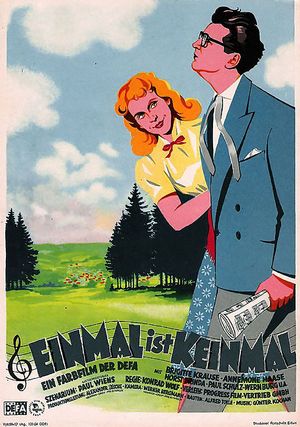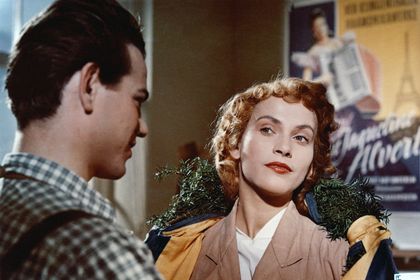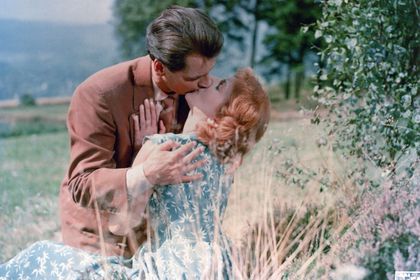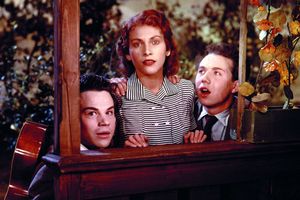Einmal ist keinmal
Director: Konrad Wolf, 97 Min., Color, Feature Film
Deutsche Demokratische Republik (DDR)
DEFA-Studio für Spielfilme, 1955
- Film/Video Format
- 35 mm
- Length in m
- 2674
- Other Title
- So klingt's in Klingenthal; So klingts in anna susanna
- English Title
- Once Does Not Count
- Premiere Date
- Release Date (for Cinema)

(Dir.: Konrad Wolf, 1955)
Short Summary (English)
Actually, the Düsseldorf musician and composer Peter Weselin only wanted to spend his placid vacation with his uncle in the Vogtland village of Klingenthal. But in the city famous for its manufacture of musical instruments, the annual music festival is about to start. For the festival, the accordion factory asks Peter for a large composition for the symphonic orchestra. Furthermore, cute Anna asks him to write a pop song for her youth dance band. Thus, Peter finds no rest during his vacation. Then Peter falls in love with the initially rather capricious Anna as well. And in questions of love, he also has to stand by his uncle Edeltanne who has cast an eye on Anna’s friend Elvira.
(Source: filmportal)

(Dir.: Konrad Wolf, 1955) Photography: Herbert Kroiss

(Dir.: Konrad Wolf, 1955) Photography: Herbert Kroiss
Film Crew
- Director
- Script
-
- Konrad Wolf
- Paul Wiens
- Scenario
-
- Paul Wiens
- Camera
-
- Werner Bergmann
- Peter Sbrzesny (2. Kamera)
- Ernst Kunstmann (Trick)
- Film Editing
-
- Friedel Welsandt
- Cast
-
- Horst Drinda (Peter Weselin)
- Brigitte Krause (Anna Hunzele)
- Paul Schulz-Wernburg (Edeltanne)
- Annemone Haase (Elvira)
- Christoph Engel (Erwin)
- Friedrich Gnaß (Hunzele)
- Georg Niemann (Düdelit-Düdelat)
- Lotte Loebinger (Muhme)
- Hilmar Thate (Buhlemann)
- Fritz Decho (Fibrament)
- Horst Gentzen (Gack)
- Edgar Engelmann (Gwirz)
- Erich Brauer (Kranz)
- Johanna Bucher (Frau Kranz)
- Johannes Siegert (Dr. Scherb)
- Inge Huber (Marie Alvert)
- Norbert Christian (Pinco)
- Johannes Arpe (Arzt)
- Gertrud Paulun (Haushälterin)
- Norbert Christian (Pinco)
- Gustav Müller (Wadenwärmer)
- Liska Merbach (Luise)
- Paul Pfingst (Fahrer)
- Jutta Beetz (Rothaarige Dame)
- Maika Joseph (Beerenfrau)
- Lotte Meier (Beerenfrau)
- Rolf Bartholsen (Briefträger)
- Jutta Zoff (Akkordeonsolistin)
- Assistant Director
-
- Ursula Pohle
- Werner Hartmann
- Assistant Camera
-
- Hans Heinrich
- Roland Dressel
- Production Design
-
- Alfred Tolle
- Script Editing
-
- Karl Georg Egel
- Music
-
- Günter Kochan
- Sound
-
- Werner Klein
- Musical Performance
-
- DEFA-Sinfonieorchester (Leitung: Adolf Fritz Guhl)
- Jutta Zoff (Akkordeonsolistin)
- Costume Design
-
- Helga Scherff
- Make-Up
-
- Hanns (auch: Hans) Wosnik (auch: Wosnick)
- Paul Lange
- Charlotte Stritzke
- Production Management
-
- Alexander Lösche
- Unit Production Management
-
- Fritz Brix
- DEFA Photography
-
- Herbert Kroiss
Short Summary (German)
Peter Weselin, ein Düsseldorfer Musiker, kommt ins vogtländische Klingenthal, um bei seinem Onkel ein paar Wochen geruhsamen Urlaub zu verbringen. Doch dort, in der Stadt des Instrumentenbaus, stehen die jährlichen Musiktage vor der Tür, und alle stürzen sich mit Kompositionswünschen auf Peter. Das Akkordeonwerk bittet um eine große Komposition fürs Sinfonieorchester, und die hübsche Anna möchte einen Schlager für ihre Jugendtanzkapelle. Aus beschaulichen Ferien wird also nichts, zumal sich Peter in die kecke und anfangs ziemlich launenhafte Anna verliebt. Und auch die Liebesangelegenheiten von Onkel Edeltanne, der ein Auge auf Annas Freundin Elvira geworfen hat, müssen einer Lösung nähergebracht werden.
(Quelle: Das zweite Leben der Filmstadt Babelsberg. DEFA-Spielfilme 1946-1992)
Short Summary (Other Languages)
Peter Weselin, musicista di Düsseldorf, trascorre qualche settimana di vacanza da suo zio a Klingethal, nota per la costruzione di strumenti musicali. Proprio in quel periodo, la città si prepara a celebrare l'annuale festival della musica e tutti si lanciano su Peter, chiedendogli una sua composizione. La fabbrica delle fisarmoniche vuole una grande composizione per l'orchestra sinfonica e la bella Anna chiede un grande successo per l'orchestra da ballo giovanile. Peter sarà costretto a dimenticare le vacanze e mettersi al lavoro, soprattutto per soddisfare Anna, di cui si è innamorato. Anche le questioni di cuore dello zio, innamoratosi di un'amica di Anna, vanno risolte. (Italienisch)



